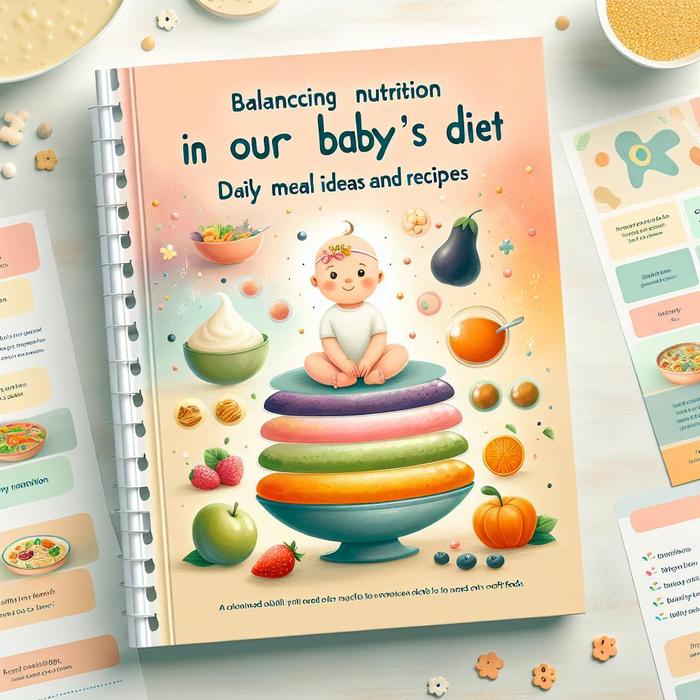A Deep Dive into Balanced Nutrition for Babies
Navigating the journey of parenthood brings numerous challenges, and ensuring balanced nutrition for your baby is one of them. It’s not just about finding healthy recipes, but also about understanding your baby’s dietary needs and incorporating them into daily meal ideas. Let’s delve into what it means to provide balanced nutrition for your little ones and how you can achieve it.
The Importance of Balanced Nutrition for Babies
A well-rounded diet is vital during the early years, as it lays the foundation for a child’s cognitive and physical development. According to UNICEF, balanced nutrition means providing your baby with a variety of foods that meet their nutritional needs. It isn’t just about feeding your baby, but ensuring their meals are rich in nutrients to support their rapid growth and development.
Baby Meal Planning Tips to Ensure Balanced Nutrition
Meal planning can indeed be a daunting task, especially for new parents. But fret not; we have some useful baby meal planning tips to ensure your baby gets a balanced, nutritious diet.
- Understand Your Baby’s Nutritional Needs: During the first year, a baby’s nutritional needs change rapidly. It’s important to stay informed about what nutrients your baby needs at each stage. Websites like CDC and WhatToExpect provide detailed information about this.
- Introduce a Variety of Foods: Diversity in diet not only ensures balanced nutrition but also helps your baby get accustomed to different tastes, textures, and colors. Include fruits, vegetables, grains, lean proteins, and dairy products in your baby’s diet.
- Balance is key: Striking a balance between different food groups is essential. Make sure each meal has a good blend of carbohydrates, proteins, and fats. Also, consider the vitamins and minerals your baby needs.
- Plan Ahead: Planning meals ahead of time can help manage your time better and ensure your baby gets a diverse and balanced diet. Also, it reduces the stress of last-minute meal decisions.
Daily Meal Ideas for Your Baby
As your baby grows, their meal plans should evolve to incorporate a wider variety of nutrients. Here are some daily meal ideas that can make meal times enjoyable, fun, and nutritious.
- Breakfast: Start the day with a nutrient-rich breakfast. It could include mashed avocados and bananas, oatmeal with natural yogurt, or baby-friendly scrambled eggs.
- Lunch: For lunch, you can serve puréed vegetables or meats, soft-cooked grains like rice or quinoa, and mashed fruit for dessert.
- Dinner: Dinner can comprise soft-cooked veggies, grains, and lean meat or tofu. Finish up with a fruit-based dessert like stewed pears or baked apples.
Turning Mealtime into Bonding Time
While nutrition is important, mealtimes can also be an opportunity for bonding and stress-relief. Remember, the goal isn’t just to feed your baby, but also to create a positive and enjoyable food environment. Let your baby explore the food, let them eat at their own pace, and most importantly, join in and make mealtime a family event.
Supplementing Baby’s Diet with Nutritious Snacks
Though mealtimes are critical, don’t forget about the mid-meal breaks—doesn’t your little bundle of joy deserve a nutritious boost between main meals? Between breakfast, lunch, and dinner, there’s ample room for healthy snacks to supplement the nutrient intake. Here is a handy guide to healthy snacking for your infant.
- Fruits: Packed full of vitamins, minerals and fiber, fruits are a great snack option for babies. Make it sure they are well-ripened and mashed or cut into small, manageable chunks.
- Vegetables: Cooked veggies like broccoli, sweet potato or carrot are soft, easy-to-digest, and full of essential nutrients. Serve them as finger food or mashed with a pinch of seasoning.
- Whole-Grain Food: Whole-grain cereals or bread, cooked whole-grain pasta, or crackers are rich in fiber and complex carbohydrates, which are great for keeping the baby’s little stomach satisfied longer.
- Dairy Products: Full fat natural yogurt, cottage cheese or small pieces of hard cheeses are high in calcium and protein and make excellent snack options.
Keeping Your Baby Hydrated
Proper hydration is integral to maintaining the health of your little one. Besides consuming liquid through milk or semi-solid food, babies over six months should also be gradually introduced to water. It’s a great palate cleanser, aids with digestion and provides essential fluoride. Moreover, hydration becomes increasingly important as babies become more active.
Safe and Hygienic Food Handling
No discussion about baby’s nutrition can be complete without emphasizing the importance of hygiene. Cleanliness, while preparing, serving and storing baby’s food, is vital to prevent foodborne illnesses. Remember, an infant’s immune system is still developing, and hence, they are more susceptible to infections.
Be Mindful of Food Allergies and Intolerances
It’s crucial to be watchful for signs of food allergies or intolerances in your baby. As you are introducing a variety of food items for the first time, pay close watch to any unusual symptoms that may indicate an allergic reaction. Keep in mind, some allergies can be serious. Hence, if you suspect a food allergy, it’s always better to seek professional help.
Recognizing Baby’s Cues
Attentiveness to your baby’s cues is an essential aspect of feeding them. Babies usually have their way of signalling when they are full or still hungry. Overfeeding or underfeeding can both disrupt nutritional balance. So, keep an eye out and learn to decipher those signals.
Monitoring Your Baby’s Growth and Development
Regular growth and development monitoring can help ensure your baby is meeting their milestones. This not only includes weight gain, but also other developmental aspects like motor skills, cognition, and language. If you are ever unsure or worried, it’s best to consult your pediatrician.
Additional Resources
There’s a lot to learn when it comes to nutrition for babies, and having reliable resources at your fingertips can make the journey much easier. Websites such as healthychildren.org, healthychildren.org for younger babies and raisingchildren.net.au are filled with quality, practical information. They offer menus, nutritious recipes, feeding guides and so much more!
